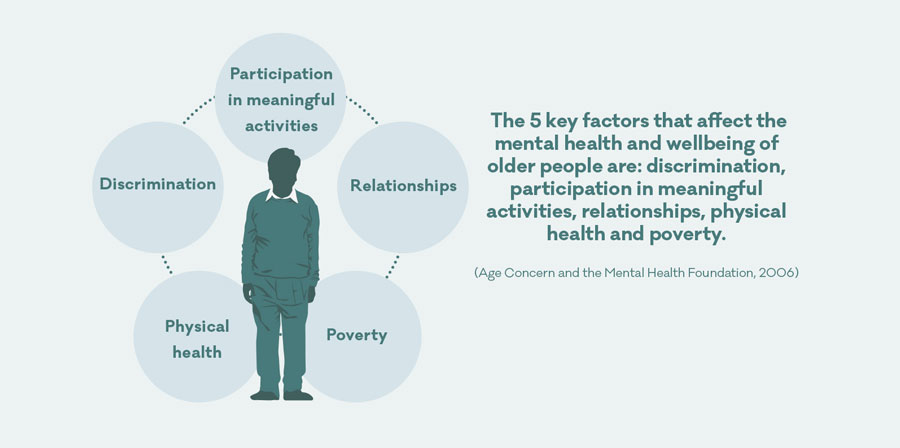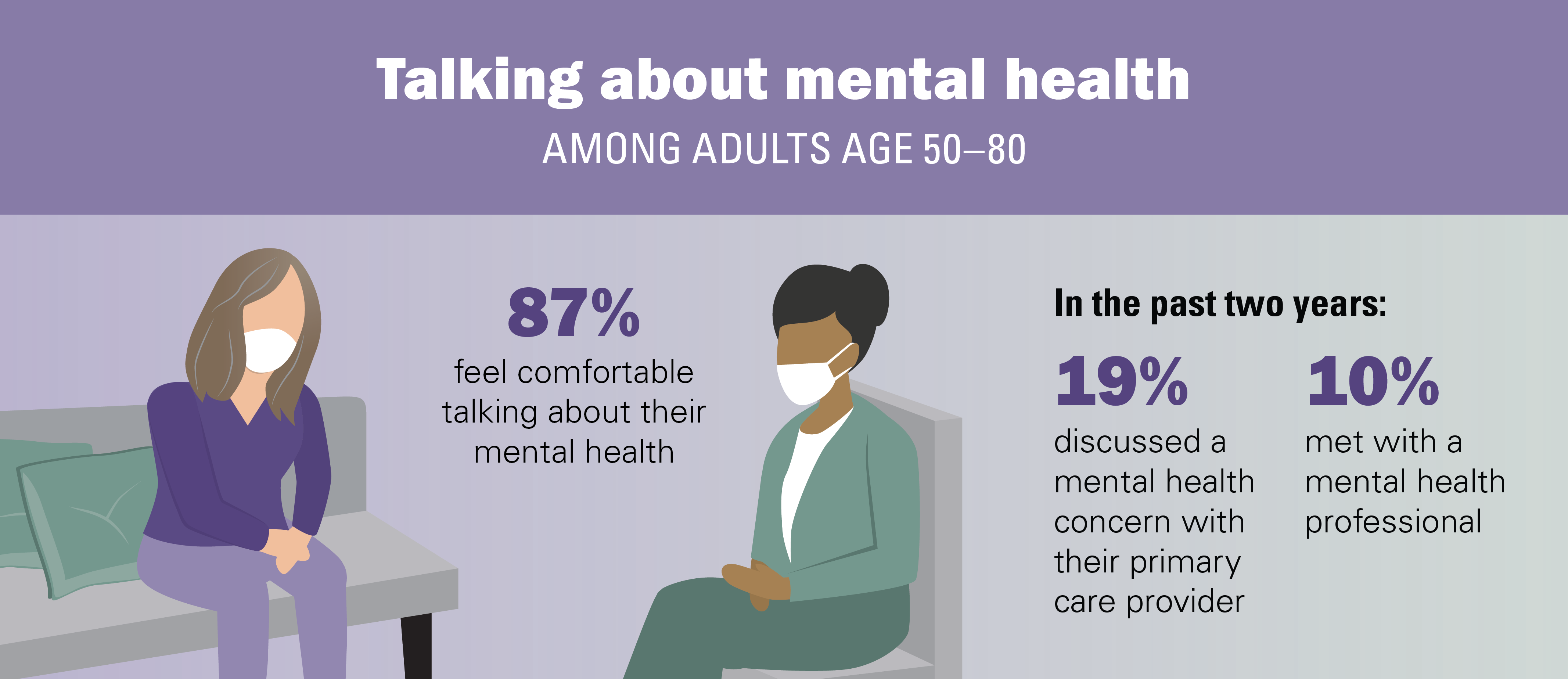Introduction
Aging is a complex developmental stage characterized by biological, psychological, and social changes. While many elderly individuals adapt successfully to later life, a significant proportion experience challenges that affect their mental health and psychological well-being. According to Birren and Schaie (2001), there are multiples issues affecting the mental health of the elderly, ot only involves cognitive and physical decline but also requires coping with multiple psychosocial stressors, including bereavement, health problems, and social isolation.
These stressors, coupled with pre-existing vulnerabilities, can contribute to a higher risk of mental health problems such as depression, anxiety, and cognitive impairment. Issues affecting mental health in old age are shaped not only by individual differences but also by cultural, social, and economic contexts (Eyetsemitan & Gire, 2003).
Read More: Geropsychology
1. Cognitive Decline and Dementia
One of the most significant mental health challenges for older adults is cognitive decline. Normal aging is often accompanied by gradual changes in memory, attention, and problem-solving abilities (Hurlock, 1981). While mild cognitive impairment is considered a typical part of aging, more severe forms such as dementia represent pathological conditions with profound psychological consequences. Dementia, particularly Alzheimer’s disease, affects not only cognitive functioning but also emotional stability and behavior (Schulz, 2006).
The loss of memory and autonomy associated with dementia can lead to frustration, depression, and reduced self-esteem. According to Feldman and Babu (2011), individuals with dementia often experience disorientation, confusion, and impaired judgment, which contribute to social withdrawal. Moreover, caregivers and family members also face psychological strain, creating a reciprocal cycle of distress.
2. Depression in Old Age
Depression is one of the most common psychiatric conditions among the elderly, often underdiagnosed due to the misconception that sadness is a natural part of aging. Comer (2007) explains that late-life depression may arise from multiple factors, including bereavement, social isolation, financial difficulties, and physical illness. Unlike depression in younger adults, elderly depression frequently manifests with somatic complaints such as fatigue, insomnia, and pain, making detection more difficult (Taylor, 1999).

Mental Health Among Older Adults
The implications of untreated depression are severe, as it increases the risk of disability, cognitive decline, and even suicide. Birren and Schaie (2001) highlight that older men, in particular, have a higher suicide rate compared to other demographic groups, reflecting the profound impact of psychological distress when social support and coping mechanisms are inadequate.
3. Anxiety Disorders
In addition to depression, anxiety disorders are prevalent among elderly populations. Anxiety may stem from fears of illness, financial insecurity, or the loss of independence (Feldman & Babu, 2011). Health anxiety, for example, is particularly pronounced in older adults, who may misinterpret physical symptoms as signs of serious illness. Johnson and Walker (2016) note that existential anxiety—related to death, dying, and spiritual meaning—also becomes more salient in later life. Persistent anxiety not only reduces quality of life but can exacerbate physical conditions such as cardiovascular disease, creating a vicious cycle between psychological and physical health.
4. Social Isolation and Loneliness
Social isolation is another critical factor influencing mental health in old age. As individuals retire, lose friends and spouses, or face mobility restrictions, opportunities for social interaction may diminish (Schulz, 2006). Loneliness has been strongly associated with depression, anxiety, and cognitive decline (Eyetsemitan & Gire, 2003). Hurlock (1981) emphasizes that social relationships are essential for maintaining emotional balance, and their absence can accelerate psychological deterioration.

Issues with Aging
The digital divide exacerbates isolation for many older adults, as they may lack access to or familiarity with technology that facilitates social connection. While some elderly individuals adapt by engaging in community activities or intergenerational programs, others remain marginalized, compounding their vulnerability to mental health problems.
5. Physical Health Comorbidities
Physical illnesses such as cardiovascular disease, arthritis, diabetes, and sensory impairments often coexist with psychological conditions in older adults. Taylor (1999) highlights the bidirectional relationship between physical and mental health: chronic illness can increase the risk of depression, while poor mental health can worsen physical outcomes. Pain, disability, and reduced independence contribute significantly to psychological distress (Birren & Schaie, 2001).
Furthermore, medications used to treat chronic conditions may have side effects that mimic or exacerbate psychiatric symptoms. For instance, some antihypertensive drugs may induce fatigue or mood changes, complicating the clinical picture (Schulz, 2006).
6. Loss and Bereavement
The loss of spouses, siblings, friends, and peers is an inevitable aspect of aging, and bereavement poses a substantial risk to mental health. According to Johnson and Walker (2016), grief reactions in the elderly may be prolonged and complicated by physical frailty and limited social support. Loss also challenges older adults’ sense of identity and security, especially when long-term partners are involved.
Bereavement can precipitate depression, anxiety, and even physical decline. However, spiritual beliefs and community support often play protective roles in helping older adults cope with loss (Johnson & Walker, 2016).
7. Stigma and Underdiagnosis of Mental Illness
Despite the prevalence of mental health issues among the elderly, stigma continues to hinder recognition and treatment. Many older adults internalize the belief that psychological distress is a normal part of aging, preventing them from seeking help (Comer, 2007). Health professionals may also underdiagnose or misattribute symptoms to physical illness or “senility” rather than mental health disorders (Birren & Schaie, 2001).

Mental Health Among Older Adults
This stigma results in a treatment gap, where elderly individuals receive inadequate mental health services. Schulz (2006) emphasizes the need for geriatric psychiatry and integrated health care approaches that recognize the interplay between physical, cognitive, and emotional health.
8. Institutionalization and Elder Care
Institutionalization, such as admission to nursing homes, can also impact mental health. While institutional care provides safety and medical support, it often involves loss of autonomy, restricted social networks, and feelings of abandonment (Eyetsemitan & Gire, 2003). Depression and anxiety are common in institutionalized elderly populations, particularly when staff-to-patient ratios are inadequate or when individuals lack meaningful activities (Feldman & Babu, 2011).
Creating a supportive environment that fosters dignity, social engagement, and individualized care can mitigate these negative effects.
Protective Factors and Resilience
Not all elderly individuals experience poor mental health; many adapt successfully and maintain well-being despite challenges. Protective factors include strong social support, effective coping strategies, spiritual engagement, and lifelong learning (Johnson & Walker, 2016). Birren and Schaie (2001) emphasize the importance of maintaining cognitive stimulation through reading, hobbies, and social participation. Taylor (1999) highlights the role of health-promoting behaviors such as exercise, balanced diet, and stress management in protecting against mental illness.
Community programs, intergenerational connections, and mental health interventions tailored to older adults can enhance resilience and improve quality of life.
Conclusion
The mental health of the elderly is influenced by a complex interplay of biological, psychological, and social factors. Cognitive decline, depression, anxiety, social isolation, bereavement, physical health problems, stigma, and institutionalization represent major challenges. However, protective factors such as social support, spirituality, resilience, and engagement in meaningful activities can buffer against these risks. Addressing the mental health needs of older adults requires a holistic approach that integrates medical, psychological, and social care while challenging the stigma that surrounds aging and mental illness. By fostering supportive environments and promoting resilience, society can ensure that the later years of life are not merely characterized by decline but enriched with meaning and dignity.
References
Birren, J. E., & Schaie, K. W. (2001). Handbook of the psychology of aging (5th ed.). Academic Press.
Comer, R. J. (2007). Abnormal psychology (6th ed.). Worth Publishers.
Eyetsemitan, F. E., & Gire, J. T. (2003). Aging and adult development in the developing world: Applying Western theories and concepts. Library of Congress.
Feldman, R. S., & Babu, N. (2011). Discovering the life span. Pearson.
Hurlock, E. B. (1981). Developmental psychology: A life-span approach (5th ed.). Tata McGraw-Hill.
Johnson, M., & Walker, J. (2016). Spiritual dimensions of aging. Cambridge University Press.
Schulz, R. (2006). The encyclopedia of aging: A comprehensive resource in gerontology and geriatrics (4th ed.). Springer.
Taylor, S. E. (1999). Health psychology (4th ed.). McGraw-Hill.
Niwlikar, B. A. (2025, September 10). 8 Important Issues Affecting the Mental Health of the Elderly. Careershodh. https://www.careershodh.com/issues-affecting-the-mental-health-of-the-elderly/
